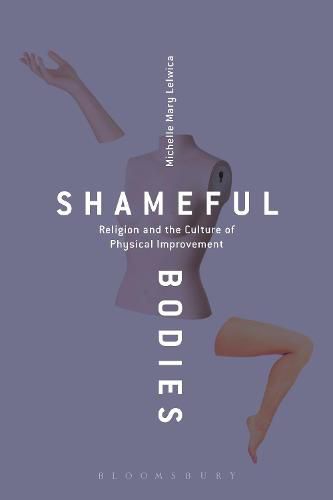Readings Newsletter
Become a Readings Member to make your shopping experience even easier.
Sign in or sign up for free!
You’re not far away from qualifying for FREE standard shipping within Australia
You’ve qualified for FREE standard shipping within Australia
The cart is loading…






What happens when your body doesn’t look how it’s supposed to look, or feel how it’s supposed to feel, or do what it’s supposed to do? Who or what defines the ideals behind these expectations? How can we challenge them and live more peacefully in our bodies?
Shameful Bodies: Religion and the Culture of Physical Improvement explores these questions by examining how traditional religious narratives and modern philosophical assumptions come together in the construction and pursuit of a better body in contemporary western societies. Drawing on examples from popular culture such as self-help books, magazines, and advertisements, Michelle Mary Lelwica shows how these narratives and assumptions encourage us to go to war against our bodies-to fight fat, triumph over disability, conquer chronic pain and illness, and defy aging. Through an ethic of conquest and conformity, the culture of physical improvement trains us not only to believe that all bodily processes are under our control, but to feel ashamed about those parts of our flesh that refuse to comply with the cultural ideal. Lelwica argues that such shame is not a natural response to being fat, physically impaired, chronically sick, or old. Rather, body shame is a religiously and culturally conditioned reaction to a commercially-fabricated fantasy of physical perfection.
While Shameful Bodies critiques the religious and cultural norms and narratives that perpetuate external and internalized judgment and aggression toward shameful bodies, it also engages the resources of religions, especially feminist theologies and Buddhist thought/practice, to construct a more affirming approach to health and healing-an approach that affirms the diversity, fragility, interdependence, and impermanence of embodied life.
$9.00 standard shipping within Australia
FREE standard shipping within Australia for orders over $100.00
Express & International shipping calculated at checkout
What happens when your body doesn’t look how it’s supposed to look, or feel how it’s supposed to feel, or do what it’s supposed to do? Who or what defines the ideals behind these expectations? How can we challenge them and live more peacefully in our bodies?
Shameful Bodies: Religion and the Culture of Physical Improvement explores these questions by examining how traditional religious narratives and modern philosophical assumptions come together in the construction and pursuit of a better body in contemporary western societies. Drawing on examples from popular culture such as self-help books, magazines, and advertisements, Michelle Mary Lelwica shows how these narratives and assumptions encourage us to go to war against our bodies-to fight fat, triumph over disability, conquer chronic pain and illness, and defy aging. Through an ethic of conquest and conformity, the culture of physical improvement trains us not only to believe that all bodily processes are under our control, but to feel ashamed about those parts of our flesh that refuse to comply with the cultural ideal. Lelwica argues that such shame is not a natural response to being fat, physically impaired, chronically sick, or old. Rather, body shame is a religiously and culturally conditioned reaction to a commercially-fabricated fantasy of physical perfection.
While Shameful Bodies critiques the religious and cultural norms and narratives that perpetuate external and internalized judgment and aggression toward shameful bodies, it also engages the resources of religions, especially feminist theologies and Buddhist thought/practice, to construct a more affirming approach to health and healing-an approach that affirms the diversity, fragility, interdependence, and impermanence of embodied life.